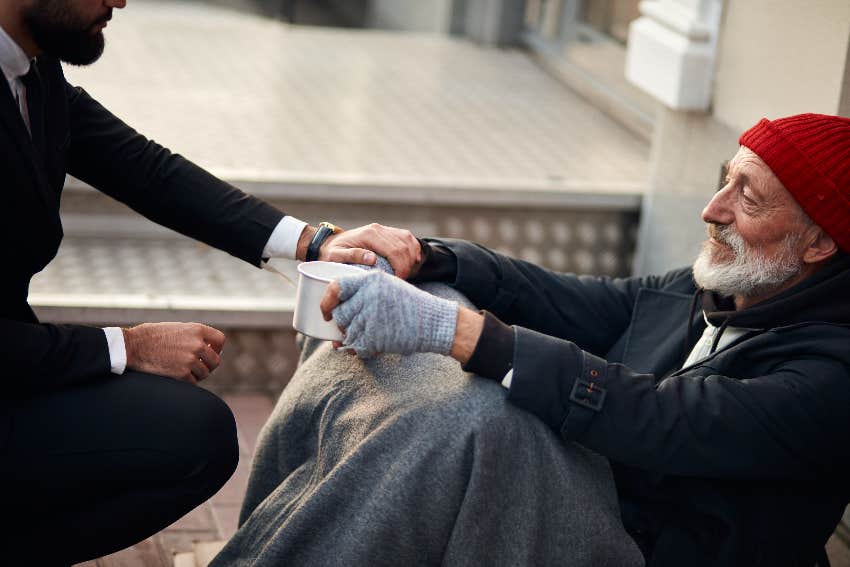Boys Who Grow Up To Be Well-Adjusted Men Are Taught These 20 Things By Their Parents
What young boys needs to know to take on the world and become emotionally-regulated men.
 Darren Baker | Canva
Darren Baker | Canva A girl who rolls with the boys and plays sports is celebrated for her strength — "Stop telling little girls they're pretty," we all scream — but what about the boys who'd rather play quietly with dolls, who like the color pink, and who feel the need to cry every once in a while?
Empathy, kindness, love — these aren't feminine qualities; they're human qualities, and important ones at that. Rather than only focus on teaching our daughters to dodge bullets and jump over societal roadblocks, why not teach our sons to help move those roadblocks out of the way?
To be respectful, kind, caring, sensitive, empathetic — these should be emphasized, not touted as signs of masculine weakness. Instead, we ridicule and emasculate our smallest boys; we make excuses for them. "Boys will be boys," we say, shrugging our shoulders.
Well then, maybe we need to redefine what it means to be a boy, a man. If we want to understand how to raise a boy right, maybe we should start saying these things instead.
Boys who grow up to be well-adjusted men are taught these things by their parents:
1. There are many ideas of what it means to "be a man"
But the true test of manliness is how you treat others, especially those smaller and weaker.
2. You aren't just a man; you're a human
 Shakirov Albert / Pexels
Shakirov Albert / Pexels
The most important qualities a human can possess are kindness, empathy, and a loving heart. The concept of gender socialization explores how societal expectations of masculinity can limit boys' emotional expression, empathy, and understanding of their own needs.
According to a study published by Frontiers in Psychology, this highlights the importance of actively teaching them to acknowledge their full range of human emotions and experiences. Challenging gender stereotypes that portray 'real men' as emotionless or physically dominant can help boys feel comfortable expressing a wider range of emotions without fear of judgment.
3. In many parts of the world, girls don't have the same rights as boys
This isn't fair, but it's important to recognize the inequality.
4. It might not be fair that men hold such power in the world, but it is our reality
And like Spiderman says, "With great power comes great responsibility." Teaching boys about the responsibility associated with traditional male gender stereotypes is crucial for promoting healthy masculinity. It can help mitigate negative behaviors often linked to these stereotypes, like aggression and emotional suppression while fostering a more balanced understanding of gender roles.
A recent study suggested interventions that challenge harmful stereotypes and encourage boys to express a broader range of emotions, develop empathy, and actively participate in household chores to cultivate a sense of shared responsibility.
5. It's okay to cry, to be sensitive, and to feel
This is part of what makes you human.
6. I can handle your tears and vulnerability without cringing from the social pressures around me
Having a little boy can challenge our ideas of masculinity on a subconscious level, and we have to be honest about that — about our fears, and our stereotypes — if anything is going to change. Please pay close attention to your son's face and overall posture, reading the signs that he seems on the brink of tears. Naming what you see allows your son to feel seen and is also a gentle way of continuing to invite the expression of emotion.
Research published by the Family Institute at Northwestern University explained that many of us say, “Don’t cry,” to nudge kids to a brighter place so that we, too, can feel better. It would be wrong to ask your son to sacrifice the healthy expression of emotion to help yourself feel better.
7. There are no "right" ways for boys to act or "right" ways for girls to act
These are social constructs, and social constructs are largely lies. Be you. Be good. Be respectful.
8. It's okay to feel the need to be physical, it's hardwired into your DNA
It's also okay to shy away from violence. Gender is a spectrum, just like everything else in life. Find healthy outlets for your physicality, rather than suppressing and demonizing it.
Teaching boys to understand the importance of healthy physical outlets is crucial for their emotional well-being. Regular physical activity can effectively manage excess energy, reduce stress, boost mood, and improve self-esteem, particularly in a demographic often prone to behavioral issues when unable to channel their energy appropriately.
A recent study published in the Journal of Affective Disorders suggested encouraging various physical activities beyond traditional sports, including dance, martial arts, outdoor exploration, and active play, to cater to individual interests.
9. Masculinity isn't something you have to prove
 insta_photos / Shutterstock
insta_photos / Shutterstock
Femininity isn't something to avoid or ridicule. Although there are obvious biological differences between boys and girls, we all deserve respect. You're capable of treating people, all people, with compassion and respect.
10. When someone says "no" or "stop," you listen, especially if it concerns someone else's body
You aren't entitled to put your hands on anyone, and you should expect the same in return. "No" isn't a bad word; it's an important word. Teaching boys to respect "no" or "stop" requires a multifaceted approach. This approach should focus on building empathy, clear communication, positive reinforcement, and addressing potential underlying reasons for disregard.
It should also consider factors like developmental stage and individual needs. Recent research published by the Child Mind Institute found this often involves modeling appropriate behavior, actively listening, and providing clear consequences when crossing boundaries.
11. It's okay to feel angry
I can handle your anger. I can hear about your dark thoughts without judgment. I can see that your anger is coming from a deeper hurt and that it might be easier to express it in the form of aggression. Find the sadness. Find your vulnerability. It's OK.
12. You aren't defined by your gender role or cultural expectation
It's easier for society to lump us into categories with neat distinctions. In reality, life doesn't have such clear boundaries. Teaching boys that they are not solely defined by traditional gender expectations can positively impact their self-esteem, mental health, and academic performance by allowing them to express a broader range of emotions and interests while mitigating the harmful effects of toxic masculinity.
Research from Birmingham City University demonstrates that actively challenging gender stereotypes in classrooms and homes can help boys feel more comfortable exploring interests typically considered feminine and develop a healthier sense of self.
13. You aren't defined by your clothes, car, bank account, muscles, or girlfriend (or boyfriend)
You're defined by your character.
14. If you fall in love with someone of the same gender, it's okay
I just want you to be happy and at ease with who you are. Teaching boys to be comfortable with their identities involves fostering emotional literacy, allowing them to express a full range of emotions, challenging traditional masculine stereotypes, and providing supportive environments where vulnerability is accepted.
Research published by the Greater Good Science Center at the University of California, Berkeley found this can be done while addressing the societal pressures that may discourage boys from expressing their true selves.
15. Respect is always in style
 adriaticfoto / Shutterstock
adriaticfoto / Shutterstock
The key to getting a date with anyone is confidence and self-respect.
16. If you have to convince someone to date you, they aren't the right person for you
If they start playing games, are at all unsure or wishy-washy, then walk away. The best kind of relationship is the kind where both people are equally excited about it. You deserve more than lukewarm uncertainty, no matter how attractive they are.
Findings from a 2018 study on healthy relationship dynamics, social cues, and adolescent development strongly support the concept that persuading someone into a relationship is a sign of incompatibility and should be avoided. Address potential anxieties about rejection and encourage boys to develop healthy coping mechanisms to manage disappointment if someone doesn't reciprocate their feelings.
17. It's normal to be curious about your body
It's not dirty or sinful, but it's also a private act, so take it to the bedroom, and close the door behind you.
18. There's a strong social and emotional component to intimacy, and oftentimes girls feel it more strongly than boys
Be aware of it. They won't teach you that in school, but it's true.
19. Certain body parts will be a big deal in your life, so take good care of them
They'll want to be in the driver's seat from time to time, controlling what you say and do. Remember: YOU are in control of your actions.
20. Don't be afraid to be vulnerable
It might feel scary to be vulnerable, especially as you get older. The cultural stigma can feel heavy like a weight dragging you down. But as scary as it is, being open to hurt, failure, and uncertainty is the only way to be fully open to love, to take big risks, and to engage your humanity.
Michelle Horton is a writer and advocate. Through the Nicole Addimando Community Defense Committee, she speaks out for her sister and the countless other victims of domestic violence criminalized for their acts of survival. She's the author of Dear Sister: A Memoir of Secrets, Survival, and Unbreakable Bonds.
